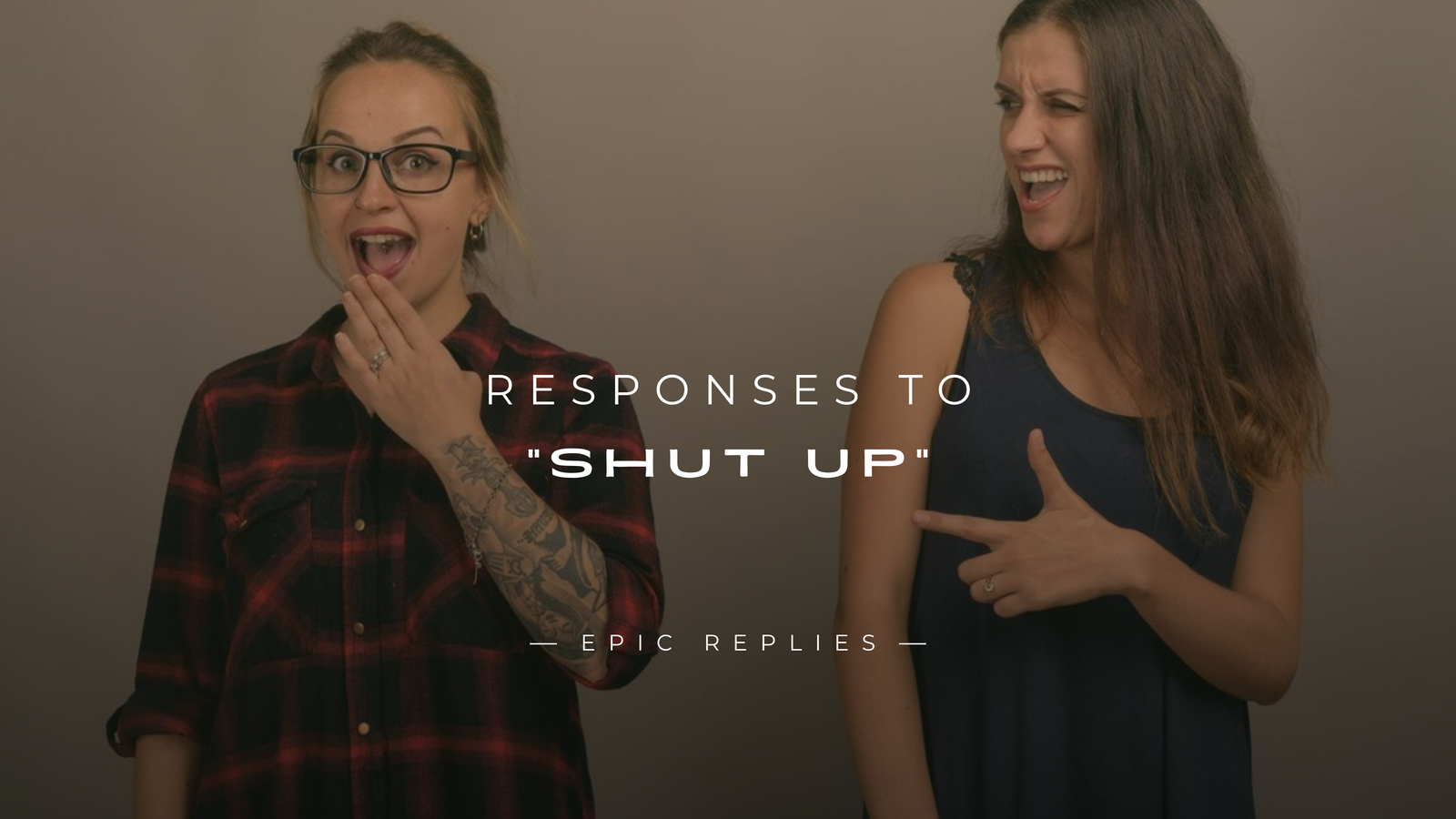You’re mid-sentence, sharing your thoughts, maybe even defending yourself—and boom! Someone throws that nasty phrase your way: “Shut up.” Instantly, it cuts deep. You feel silenced, dismissed, even humiliated.
We’ve all been there, and whether it’s said in frustration, jest, or spite, being told to “shut up” stings. It’s not just the words—it’s the message behind them: “Your voice doesn’t matter.” But guess what? It does. And how you respond can completely shift the dynamic.
In this article, we’ll break down exactly how to respond to “shut up” in various real-life scenarios—without losing your cool, your confidence, or your dignity.

220+ Responses to “Shut Up”
Calm and Composed
- I hear you—let’s talk about this calmly.
- No problem, I’ll pause if that’s what you need right now.
- It’s okay, I won’t take it personally.
- I understand you’re upset—let’s take a breath.
- I’m still here to talk when you’re ready.
- We can work this out without yelling or shutting each other down.
- I’d rather solve this than argue.
- If you need space, I’ll give it to you.
- It’s not worth fighting—let’s just listen to each other.
- I’m open to hearing you out when things cool down.
Humorous
- Oh no! I’ve been muted in real life!
- Is that a polite way of saying “you talk too much”?
- That’s fair—I do have the gift of endless commentary.
- Wow, tell me how you really feel!
- I was just getting to the good part, though!
- Should I narrate it in my head instead?
- I’ll shut up right after this last sentence… maybe.
- Okay okay, muting myself now… kinda.
- Don’t worry—I charge extra for the deluxe silence package.
- Is this where I do the dramatic movie pause?
Sarcastic
- Wow, such kindness and grace—truly inspiring.
- You must be a hit at parties.
- Oh absolutely, because silence is clearly the solution to everything.
- How eloquent—Shakespeare would be proud.
- Someone’s got their manners turned all the way up today.
- What a masterclass in communication.
- Thanks for the feedback, I’ll cherish it forever.
- You should write a book: “How to Win Friends by Shouting.”
- Noted, your majesty.
- Did that take all your emotional vocabulary?
Polite but Assertive
- I’d appreciate being spoken to respectfully.
- That’s not how I’d like to be treated.
- I don’t think shutting someone down helps either of us.
- Let’s talk this through without insults.
- I’m not raising my voice or being rude—please don’t be with me.
- I’m open to hearing you out, but I also deserve to be heard.
- That kind of language isn’t productive.
- I won’t continue this if it gets disrespectful.
- I expect mutual respect in any conversation.
- I’m staying calm—I hope you can too.
Passive-Aggressive
- Wow, charming as always.
- And here I was thinking we were having a real conversation.
- Great way to win people over, really.
- You really know how to build trust, huh?
- That response definitely solves everything.
- I guess listening is a lost art these days.
- Impressive—shut down a dialogue in one word.
- So much for respectful communication.
- Your people skills are really shining today.
- Thanks for reminding me why I usually text instead.
Confused/Innocent
- Wait, was that meant for me?
- Did I say something wrong?
- I’m sorry, did I misunderstand something?
- I didn’t think I was being rude.
- Are you okay? That seemed out of nowhere.
- Was I talking too much?
- I wasn’t trying to upset you.
- Did I miss something?
- I thought we were just talking.
- That felt a little harsh—what’s going on?
Deflecting
- Anyway, where were we before that?
- Noted. Now, about what we were discussing…
- I’ll take that as passion—let’s move forward.
- Let’s stay focused here.
- Right, so back to the point.
- That aside, here’s what I was trying to say.
- No worries—moving on.
- You’re clearly passionate—so let’s channel that.
- Can we stay on track here?
- Message received. Back to business?
Ignoring
- [Slight pause, continues talking]
- [Looks away, carries on speaking later]
- [Silent response; moves the conversation forward]
- [Maintains eye contact, unbothered]
- [No reaction; simply keeps doing what they were doing]
- [Takes a deep breath and calmly resumes]
- [Doesn’t acknowledge the comment at all]
- [Looks mildly amused, says nothing]
- [Continues without addressing the interruption]
- [Shifts focus entirely to something else]
Agreeing (Mock Compliance)
- Oh no! The talking police got me!
- Yes, boss. I live to serve.
- Roger that—mute mode activated.
- Your wish is my command… for now.
- Shutting up in 3… 2… just kidding.
- You got it. My lips are sealed… almost.
- Sure, I’ll shut up. But only because I like you.
- Anything for peace and quiet—especially mine.
- If silence is golden, I’m platinum now.
- Okay, I’m done. Wait—just one more thing…
Calling Out Rudeness
- That was unnecessary—there’s a better way to express yourself.
- Telling someone to shut up isn’t respectful, and I’d expect better.
- That kind of language crosses a line.
- If we’re having a real conversation, respect needs to go both ways.
- I don’t accept being spoken to like that.
- If something I said bothered you, say so—without being rude.
- I don’t think anyone deserves to be told to shut up.
- You can disagree without being disrespectful.
- If this is how you communicate, I’m not interested.
- That was out of line—try again if you actually want to talk.
Setting a Boundary
- I’m not okay with being told to shut up.
- If we’re going to talk, I need mutual respect.
- That’s not how I let people speak to me.
- I won’t engage in this kind of conversation.
- I’ll continue when this is civil.
- You don’t get to decide when I speak.
- I’m setting a line here—don’t cross it again.
- If that’s how this goes, I’m stepping away.
- I speak up for myself, and I’m not stopping.
- You can express your frustration without silencing me.
Empathetic
- Sounds like you’re overwhelmed—want to talk about it?
- I know this might be frustrating—how can I help?
- That was harsh—are you okay?
- Seems like you’re going through something.
- If you need space, just say so—I’ll respect it.
- I’m not trying to upset you—want to restart?
- That reaction surprised me—what’s really going on?
- Let’s step back a sec. You alright?
- I’m listening—even if it’s tough right now.
- I care about what’s behind that anger. Talk to me.
Serious/Professional
- That tone isn’t appropriate here.
- Let’s keep this constructive and respectful.
- If this continues, I’ll have to step away from the conversation.
- We can disagree professionally without getting personal.
- Please communicate respectfully if we’re going to continue.
- I’m here to resolve things, not engage in hostility.
- That language isn’t acceptable in this setting.
- I’d appreciate it if we could get back on topic.
- Let’s stick to discussing the issue—not attacking each other.
- I’m here to talk, not to be disrespected.
Witty Comeback
- If I shut up, who’s going to keep things interesting?
- That’s one way to say “you’re winning this argument.”
- You must really hate fun conversations.
- A bold move—silencing the most interesting person here.
- Should I send you a script so you feel heard?
- Don’t worry, I’ll pause for your dramatic monologue.
- Shut up? But I just got started!
- Is that your way of saying you’ve got no comeback?
- Jealous of the spotlight, huh?
- If I had a dollar for every time someone said that, I’d buy your silence.
Disengaging
- I’m not doing this.
- I’ll come back when we can talk respectfully.
- This conversation isn’t healthy—I’m out.
- Not worth my energy right now.
- I’m stepping away for my own peace.
- Talk to me when you’re ready to be civil.
- Silence sounds better than this.
- I respect myself too much to stay in this.
- Logging off this convo.
- I’ll let you cool off before we continue.
Redirecting
- Let’s focus on solving the issue instead.
- This isn’t productive—how can we fix it?
- Back to what really matters here…
- Emotions are high—let’s stick to facts.
- I get it—you’re frustrated. Let’s move forward.
- Let’s steer this in a better direction.
- Can we return to the actual topic?
- This isn’t helping either of us—let’s refocus.
- I’d rather spend time resolving, not arguing.
- We both want to be heard—let’s reset.
Questioning the Command
- Why are you telling me to shut up?
- Was something I said upsetting?
- Is there a reason you’re reacting like that?
- What are you really trying to say here?
- Do you think that’s a fair way to handle disagreement?
- Why does my voice bother you so much?
- Can we talk about why that felt necessary to you?
- Is silence what you really want—or just no opposition?
- Do you think shutting people down solves anything?
- Are you okay, or is this coming from somewhere else?
Reflective
- Interesting how quick we are to silence others.
- Funny how “shut up” says more about where you are than what I said.
- That reaction probably has more to do with how you’re feeling than what I said.
- I used to respond like that too, until I realized it never helped.
- It’s amazing how easily we reject what we’re not ready to hear.
- Every time someone says “shut up,” a real conversation dies.
- I get it—listening isn’t always easy when emotions are high.
- It’s worth asking why that phrase comes up when we feel cornered.
- Silencing people usually starts when understanding ends.
- That moment just showed me how fragile real dialogue is.
Teasing
- Oh wow, someone’s grumpy today.
- Aww, did I hit a nerve?
- Say “please” and maybe I’ll consider it.
- Look who forgot their nap.
- Is this your way of flirting or just bad manners?
- You say shut up, I hear “keep talking.”
- That’s cute—now say it with a smile.
- If I shut up, you’ll miss all this personality.
- Your sass level is admirable today.
- Do you come with a volume knob too, or just an off switch?
Philosophical
- Silence can be powerful, but so can understanding.
- Words only sting when they carry truth—maybe that’s why you want silence.
- If every disagreement ends with silence, nothing ever grows.
- Voices exist to be heard—not always agreed with, but heard.
- “Shut up” is the language of fear, not reason.
- If truth makes you uncomfortable, muting it doesn’t make it go away.
- A mind closed to conversation is a mind closed to growth.
- You can silence a person, but not their perspective.
- Real maturity shows in how we respond to discomfort.
- Shutting someone up is easier than proving them wrong, isn’t it?
Confident Dismissal
- That’s not going to work on me.
- I’ve been through worse than words like that.
- You don’t have the power to silence me.
- Say what you want—I’ll keep speaking my truth.
- I’m not here to be quiet for your comfort.
- I’ve earned my voice—I’m not giving it up now.
- That line might work on others, but not on me.
- I’m not rattled, just amused.
- You can yell, I’ll still hold my ground.
- If you’re trying to shut me down, you’ll have to try a lot harder.
Playful Agreement
- Okay, okay! You win—for now.
- You got it, boss. I’m zipping it… sorta.
- I’ll shut up… after this one last sentence.
- Mute mode: activated… but only temporarily.
- Fine, I’ll be silent—but you’ll miss me.
- Alright, giving the floor to the drama king/queen.
- Okay, you earned 30 seconds of peace.
- I’ll be quiet, but I’ll be silently judging.
- Only because I’m feeling generous today.
- As you wish—briefly disappearing into silence.
The Psychology Behind Saying “Shut Up”
- What It Usually Means
Let’s call it like it is: when someone says “shut up,” they’re usually not asking for silence—they’re trying to control the conversation or dominate emotionally. It’s a verbal way of saying, “Stop talking because I don’t want to hear your opinion.”
Sometimes it’s a sign they feel overwhelmed, out of control, or even insecure. Rather than express those emotions constructively, they lash out. But remember: their inability to regulate their emotions isn’t your fault.
- When It’s Said in Anger vs. Jest
Now, not every “shut up” is created equal.
- If a friend laughs and says, “Oh my god, shut up!” after you tell a funny story, chances are it’s harmless.
- But if someone snaps, “Shut up already!” with fire in their eyes, that’s a different story.
Intent + Tone = Meaning. You don’t need to overreact to everything—but you should address it when it crosses the line.
- The Difference Between Tone and Intention
Words are just the vehicle—tone is the engine. It tells you how fast, how dangerous, or how safe the message is.
A sarcastic “shut up” might be playful. A flat-toned one? That’s usually serious. You’re allowed to ask for clarity, like:
“Just checking—was that a joke or are you upset?”
That single question opens up a world of insight.
Immediate Reactions vs. Thoughtful Responses
- Fight or Flight: The Natural Instinct
We’re wired for survival. When someone says something rude, we’re likely to:
- Clap back (“You shut up!”)
- Walk away in silence
- Freeze and feel powerless
But let’s be real—none of those usually help, right? They either escalate things or leave you stewing afterward.
- Why Pausing Before Responding Helps
Here’s your superpower: the pause.
Take a second. Breathe. Count to three. This moment of stillness helps shift your brain from emotional reacting to rational responding.
Instead of yelling, you might say calmly:
“I’m willing to talk, but not if I’m being disrespected.”
Boom. You just took back the power.
Classy Comebacks: How to Keep Your Cool
- Responding with Humor
Sometimes humor is the best deflector. It shows confidence, and even better—it disarms the other person.
Try saying:
“Wow, someone skipped their morning coffee.”
“I’d love to, but I’m too interesting.”
These witty lines lighten the tension and keep you in control.
- Using Assertiveness, Not Aggression
Assertiveness means standing your ground without attacking back. It’s saying:
“That tone isn’t okay with me.”
“Please don’t speak to me like that again.”
You’re not playing the victim or villain—you’re being clear.
- Staying Calm and Collected
Ever seen someone so calm in an argument it makes the other person look ridiculous? That can be you.
Your calmness can trigger self-awareness in them—or at the very least, keep things from blowing up.
Scenarios and Responses
- In a Heated Argument
When emotions are high, you might hear “shut up” thrown like a grenade.
Best move? Defuse.
“I want to continue this conversation when we’re both calm. Let’s take a break.”
You don’t have to prove anything in that moment. Walk away with dignity.
- When It’s Said by a Friend or Sibling
They might not mean harm, but boundaries still matter.
“I know you’re joking, but that phrase isn’t cool with me.”
Let them know how it lands—most people will adjust.
- If It Comes from a Coworker or Boss
This one’s tricky, but you have rights too.
Try saying:
“I’d like to keep our conversation respectful. Let’s focus on the issue.”
If it continues, document it and talk to HR. You deserve a safe workspace.
- When Kids Say It to You
Don’t match their immaturity with anger.
“We don’t speak to people like that. Let’s take a break and come back with better words.”
You’re not just correcting—you’re teaching.
What to Say Instead of Saying “Shut Up” Yourself
- Phrases That Say It Better
Let’s be honest—we’ve all been tempted to snap “shut up” ourselves.
Here are better alternatives:
- “Can I say something real quick?”
- “Let’s take turns talking.”
- “I need a little quiet right now, please.”
These phrases keep the peace without silencing anyone.
- Why Choosing Your Words Matters
Words stick. Even when you forget, the other person might not. Using respectful language helps build trust—even in tension.
Teaching Others Respect Through Your Response
- Setting Boundaries Without Drama
You can calmly say:
“That’s not how I allow people to talk to me.”
It’s not aggressive. It’s not weak. It’s healthy.
- Using the Moment to Promote Empathy
Ask:
“Would you want me to say that to you?”
It’s a soft nudge that encourages reflection—without a fight.
Responding to “Shut Up” Online or Over Text
- The Digital Dilemma of Tone
Online, words lose tone. Someone might type “shut up” and mean it jokingly—or seriously.
Reply with:
“Just checking—are you being serious?”
That one question keeps things from spiraling unnecessarily.
- When to Reply and When to Walk Away
Sometimes the strongest response is none at all. Don’t feed trolls. Don’t match drama with drama. Click mute, block, or unfollow when needed.
How to Deal With Chronic Disrespect
- Repetitive Patterns in Toxic Relationships
If someone tells you “shut up” often, it’s not a one-time slip—it’s a red flag. Especially if they belittle you regularly.
This is emotional abuse. And you’re allowed to say:
“This pattern isn’t healthy for me. I’m stepping back.”
- Knowing When to Set Firmer Boundaries
If polite doesn’t work, be firmer:
“I will not continue this relationship if I’m disrespected like this.”
You’re not being harsh—you’re protecting your peace.
Turning the Moment Into a Conversation
- Asking Why They Said It
Sometimes the phrase is a symptom, not the cause. Ask:
“What’s going on that made you say that?”
That single question might open the floodgates to real emotion.
- Encouraging Open Dialogue
You could say:
“Let’s talk, but only if we’re both respectful.”
Invite maturity. Invite connection. And if they’re not ready? You walk tall anyway.
When Silence Is the Best Response
- Letting Them Feel the Weight of Their Words
Sometimes your best move is to just pause, stare, and say nothing. That silence? It’s deafening.
It forces the other person to sit in what they just said.
- Using Silence as a Power Move
When you choose not to respond, you’re sending a clear message:
“I don’t accept being spoken to like that.”
No yelling. No energy wasted. Just powerful presence.
Protecting Your Mental Health
- The Toll of Verbal Disrespect
Being dismissed repeatedly chips away at your confidence. Don’t brush it off. Acknowledge the hurt so you can begin healing.
- Practicing Self-Care After Conflict
After a blow-up or harsh words, do something for you. Journal. Go for a walk. Call someone who lifts you up. You deserve to feel whole again.
Personal Growth Through Conflict
- What You Can Learn About Yourself
Moments of tension reveal your boundaries—and your ability to enforce them. You might learn you’re stronger than you thought.
- How to Grow From Uncomfortable Moments
You don’t have to be perfect. You just have to be present, aware, and willing to learn.
Every time you respond better, you grow better.
Conclusion
Handling the phrase “shut up” can be tricky—but with the right words, you can flip the script with style and humor. Whether you’re aiming for funny, flirty, or fierce, the list above arms you with responses for any situation. Remember, confidence and timing are everything. If you enjoyed these comebacks, you’ll definitely want to check out our 220+ Responses to “Where You At” [Funny, Flirty & More] for even more clever ways to keep the conversation fun and engaging!
FAQs
Q. Is it okay to ignore someone who tells you to shut up?
Absolutely. If the comment is meant to provoke, ignoring it can be a powerful way to avoid feeding negativity.
Q. How do I teach my child not to say “shut up”?
Model respectful behavior, correct them gently, and explain why the phrase is hurtful. Kids mirror what they see.
Q. What if someone keeps telling me to shut up at work?
Document the incidents, remain professional in responses, and report to HR if the behavior continues. You have a right to a respectful workplace.
Q. Can saying “shut up” ever be funny or acceptable?
Among close friends, maybe—if everyone’s on the same page. But always be aware of how it might come across.
Q. How can I stop myself from saying “shut up” in frustration?
Pause, breathe, and choose a more constructive phrase. Practice makes progress—and better communication.




